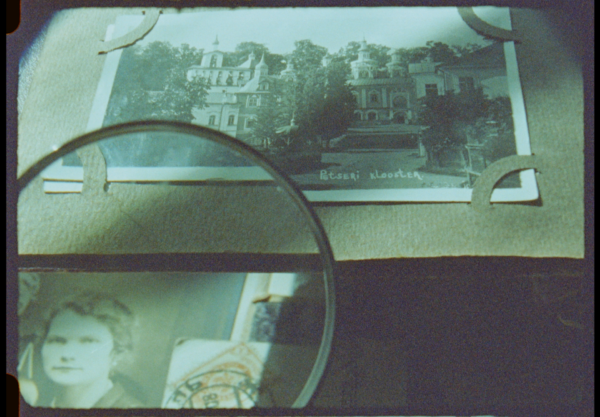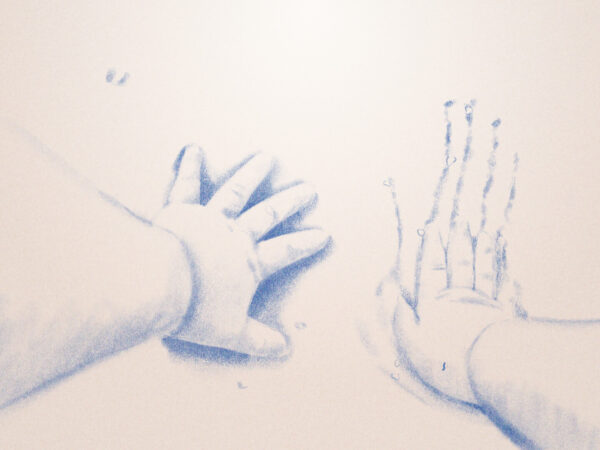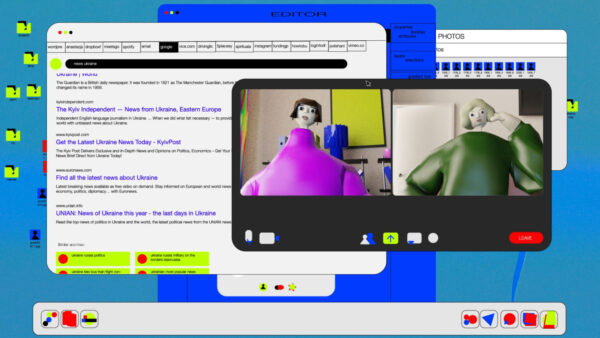Racing With Love
Sierra
With its contourless, bright, and lively 3D animation, Sierra captures the microaggression that is undeniably present in every example of parental expectations, and does so in a genteel way.

In Sierra, the newest short by Estonian filmmaker Sander Joon, there are three topoi: a greenhouse which is the mother’s domain, the father’ garage, and a tire-swing hanging from a lonely tree, belonging to their only child. The son and his swing occupy the middle ground between these two gender-delineated realms and therefore map out the terrain of the nuclear family. Yes, Sierra is a film about family but even more than that: it’s about the ambivalence embedded in a lived, familial, situation, told through fictional, surreal, and animation means.
What seems to be the only lifeline between mother and father, and their respective spaces, is the son’s free-willing, playful roaming. Swapping the glasshouse for the tumbling of the car engine, he can traverse worlds and act as a mediator for what is teased out to be a relationship suffering from miscommunication. After all, isn’t that the fate of all single children to some extent? The universality implied in this simple premise is a promise to be kept even when the narrative becomes more unpredictable and perhaps slightly bizarre. It’s the father’s obsession with racing cars that propels the plot in a less expected direction. For example, his crafty ways of plucking the child out of the comfort of his playground to place him in another, more revving kind, seem a bit too invasive: the symbolic act of putting a helmet on his son’s head resembles a smack more than an act of initiation.
With its contourless, bright, and lively 3D animation, Sierra captures the microaggression that is undeniably present in every example of parental expectations, and does so in a genteel way, in order to preserve the mutual respect and fascination informing the parent-child relationship. Facial expressions make way for expressive gestures and their repetition builds character: the mother’s watering of her numerous plants as a metaphor for maternal ways, and the father’s smoking, his hands fixated on mending car parts amidst a hefty cloud of smoke. The dialogue is completely corporeal, as bodies, hands, and heads turn, whirl, and touch with a dynamism that is furious and beautiful to behold. A slight delay in every rapid bodily movement keeps a fragment of the figure in stasis, as if to commemorate their bond to that certain chronotope—Sierra is mindful of its 3D characters’ bodies and never lets them dissipate within the background, however masterful it may be (courtesy of artist Hleb Kuftseryn).
For a film about family dynamics and car racing, Sierra sure does pay much of its attention to the intricate relation of both worlds, and its surreal lens aid in moulding a small, but complex, world, where winning a race with your dad holds the possibility of mending the flawed present. The race itself seems somehow doomed: on the one hand, we see big crowds of both supporters and mechanics, all tending to a stellar, well-equipped professional team; while on the other hand, there’s a derelict but faithful red Ford Sierra trying its best to keep the game afloat. Borrowing the brand and the name for his short film from the actual car that was passed along in his family, Joon makes the film’s source of inspiration a deeply personal one. Without reading too much into a biographic trace here, it’s safe to say that the filmmaker employs such material with a fragile intimacy in mind.
Perhaps this is also the rationale behind using found footage of a stop-motion animation (made in 1980 by none other than Sander’s dad, Heikki Joon) interspersed through the narrative. Not only is this film within the film engaging and playful, but it serves as a repository for remnants of national identity, bringing to mind the historical success of Estonian WRC competitor Ott Tänak. The short is very much influenced by 80s rally aesthetics, a warm gush of nostalgia meets dark comedy. Hidden amongst the ironic folds of the dad-and-son-compete-in-an-old-car narrative, is a heart of gold and a painful sting. What’s the price of such success? How do you become a ‘real’ man? Anxieties fueled by unquestioned masculine stereotypes seem to have transformatory powers: when the son becomes a car tire to save his dad’s wish, we are both amazed and saddened by this act of sacrifice, however surreal and funny it may be.
It’s down to the most serious questions—that of love and of sacrifice—when the film receives its bittersweet resolution. A soothing feeling accompanies the viewer as the final act unfolds, even if the visuals they face suggest otherwise: there’s a particular sense of duality that captures the charms of Sierra and the film embraces its own ambivalence in a way that is rarely seen on screen. Animation, in its 3D iteration, seems to be the most suitable form for this journey of (e)motion, with its close attention to developing the character’s physical presence and the significance in their interactions in a subdued, brown-and-purple palette. Cloaked with the colours of a burnt sunrise and a sunset, simultaneously, the characters of Sierra learn to trust and love each other as if it were the first time: there is a new beginning rooted in this end and a promise: to go slower, to be alongside each other, for a change.





There are no comments yet, be the first!